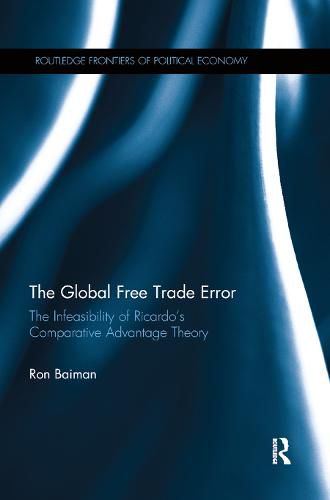Readings Newsletter
Become a Readings Member to make your shopping experience even easier.
Sign in or sign up for free!
You’re not far away from qualifying for FREE standard shipping within Australia
You’ve qualified for FREE standard shipping within Australia
The cart is loading…






The doctrine of free trade is second only to that of free markets in undergirding ideological support for our current global economic structures and rules. From David Ricardo’s comparative advantage principle to James Meade’s Neoclassical or mainstream economics proof of self-adjusting free trade equilibrium, the free trade doctrine has had a lasting and destructive hold on Neoclassical economic thinking since its inception.
The Global Free Trade Error provides a detailed analysis of these foundational models and counter-poses these to alternative Neo-Marxist unequal exchange models of global trade and finance. In the first part of the book the three core free trade models alluded to above are respectively demonstrated to be: overdetermined, inapplicable, and infeasible. In particular, Ricardo’s parable is shown to support managed trade rather than free trade as Ricardo and two centuries of economic texts have claimed. In the second part of the book, unequal exchange analyses of global trade are shown to provide logically coherent and useful insights into global trade and finance. In the third and final part of the book, this unequal exchange perspective is used, within a general demand and cost setting, to develop a set of global managed trade principles for a more equitable and sustainable world trade regime.
This book will be of great interest to those who study political economy, history of economic thought, and international trade, including trade agreements and tariffs.
$9.00 standard shipping within Australia
FREE standard shipping within Australia for orders over $100.00
Express & International shipping calculated at checkout
The doctrine of free trade is second only to that of free markets in undergirding ideological support for our current global economic structures and rules. From David Ricardo’s comparative advantage principle to James Meade’s Neoclassical or mainstream economics proof of self-adjusting free trade equilibrium, the free trade doctrine has had a lasting and destructive hold on Neoclassical economic thinking since its inception.
The Global Free Trade Error provides a detailed analysis of these foundational models and counter-poses these to alternative Neo-Marxist unequal exchange models of global trade and finance. In the first part of the book the three core free trade models alluded to above are respectively demonstrated to be: overdetermined, inapplicable, and infeasible. In particular, Ricardo’s parable is shown to support managed trade rather than free trade as Ricardo and two centuries of economic texts have claimed. In the second part of the book, unequal exchange analyses of global trade are shown to provide logically coherent and useful insights into global trade and finance. In the third and final part of the book, this unequal exchange perspective is used, within a general demand and cost setting, to develop a set of global managed trade principles for a more equitable and sustainable world trade regime.
This book will be of great interest to those who study political economy, history of economic thought, and international trade, including trade agreements and tariffs.